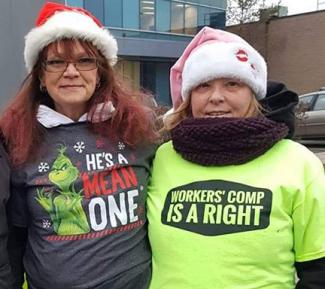UNBOWED
Injured workers continue battle for their rights

THE GRINCH IS ALL TOO REAL FOR INJURED WORKERS IN ONTARIO. The Workplace Safety and Insurance Board (WSIB) steals their Christmas from them just like the cartoon character. But, there is no happy ending for injured workers. The meanness of the WSIB lasts year after year. But the workers remain unbowed.
The Ontario Network of Injured Workers Groups (ONIWG) mounted protests over five days in December, in nine different Ontario cities, to remind the WSIB and the public that the fight for fair treatment of injured workers continues.
WSIB rulings perpetually leave too many injured workers across Ontario without enough to get by. The Progressive Conservative government decision to slash employer premiums by 30% will only make things worse. Big business will save $1.5 billion. The pool of money available to pay compensation will shrink. Compensation awards to injured workers will shrivel.
Dignity and respect is only fair
The main event of the week was a protest outside the Ministry of Labour in Toronto December 10. “The holiday season can be a difficult time for injured workers because of the WSIB’s focus on cutting compensation in order to save its own money,” explained ONIWG President Willy Noiles. “We’re calling for a system that treats us with dignity and respect. That shouldn’t be too much to ask.”
The rapid growth of precarious and temporary work increases workplace injuries.However, permanent employees are also exposed to worsening working conditions brought on by speed-up, technological change, and increased overtime.
For example, on-the-job injury was a key issue for letter carriers in their recent dispute with Canada Post. A report revealed that postal workers suffer injuries at work at a rate five times greater than the average in all other federally regulated occupations.
Workers Comp is a right
Their Workers Comp Is A Right campaign is the main focus for ONIWG. It targets the transformation of the WSIB from a system that, “is supposed to support us into one that is hostile to us.”
The bitter irony in this fight for rights is that the whole workers’ compensation system began as a favour to employers. It gave employers a way to escape the possibility of law suits mounted by injured employees that could ruin them.
The sawoff was that, while employers would pay “premiums” into a fund that would provide “compensation” to injured workers, the amounts awarded would be set by a “neutral” board. The reality is that no workers' comp board has ever been neutral. Boards always side with employers. They look to keep payouts as low as possible, and so keep employer premiums rock bottom low.
The ONIGW campaign has won support for three key demands from injured workers across the province. These include:
- no cuts to awards based on the pursuit of phantom jobs
- listen to the advice of healthcare professionals treating injured workers
- stop cutting benefits based on pre-existing conditions.
The campaign also calls on the WSIB to operate according to its founding principles, with a focus on providing humanitarian assistance to workers who have suffered physical or psychological injury at work.
Decades of anti-worker reforms to the workers comp system have left injured workers and their families confronting a number of hurdles to access the support they urgently need. These include:
- an increased likelihood of their compensation claim being denied
- delays to the appeals process, cuts to benefits
- cuts to medical rehabilitation services.
WSIB workers criticize workers' comp system
Even some WSIB employees acknowledge that the current system is broken. In answers to a request from the board’s president for feedback on how successful the WSIB is, 60 employees criticized chronic understaffing, long wait times for compensation claimants, and chaotic case management practices.
As one WSIB worker wrote, “Accident rates are going up while resolutions to (injured worker) claims are going down. There are not enough people to process work and queues keep piling up, while people that are disabled from a workplace injury are waiting for someone to get back to them. I find that embarrassing.”
Another worker explained that injured workers are often forced to wait on the phone for excessive periods of time before getting help. “It is not unheard of that clients complain of waiting in excess of 30 minutes to reach the right person,” wrote the worker. “If you can’t help an injured worker whose literal livelihood depends on the WSIB within a reasonable time frame, that’s an incredible shortfall.”
Making a change
As well as the ONIWG, many unions and labour organizations fight to defend the rights of injured workers. Unifor’s Nicole Simpson explains, “We also need to compensate injured workers, establish a fair return to work program, and shift to a workplace culture that promotes and utilizes comprehensive hazard-based health and safety programs, and training.”
If you want to get involved with campaigns to support the rights of injured workers, find out more information at the ONIWG website. You can access tools for community organizing initiatives, tips on advocacy, information on how to contact your MPP, and guidance on how to plan a campaign.
- 30 -
ONTARIO NETWORK OF INJURED WORKERS GROUPS












Add new comment